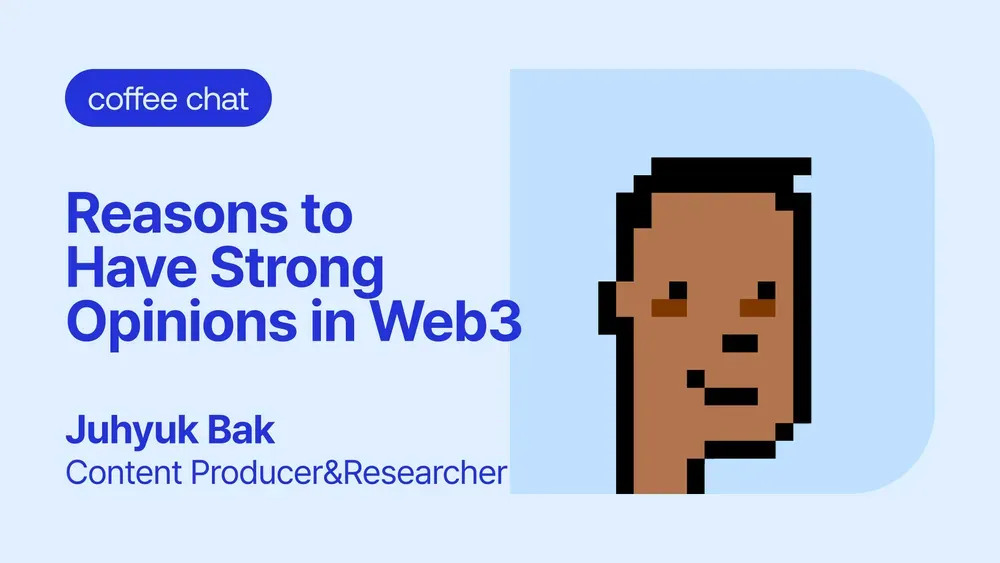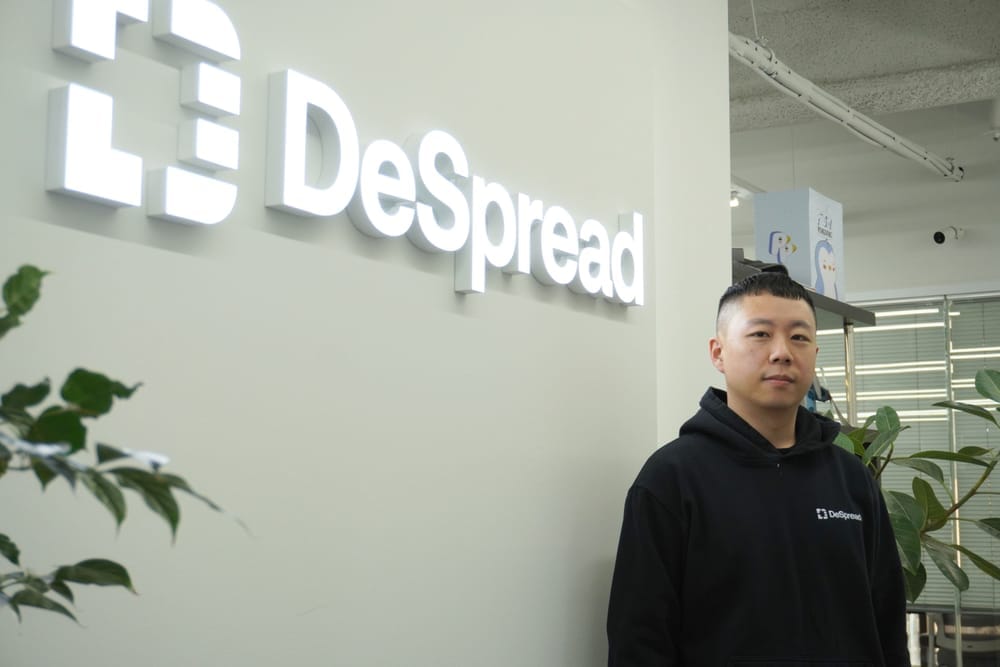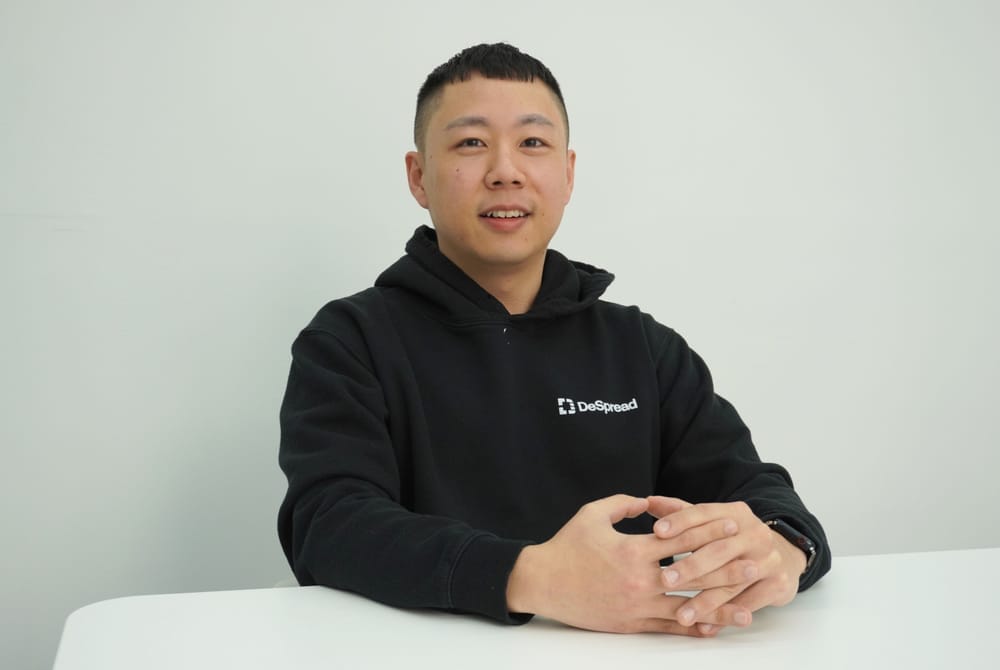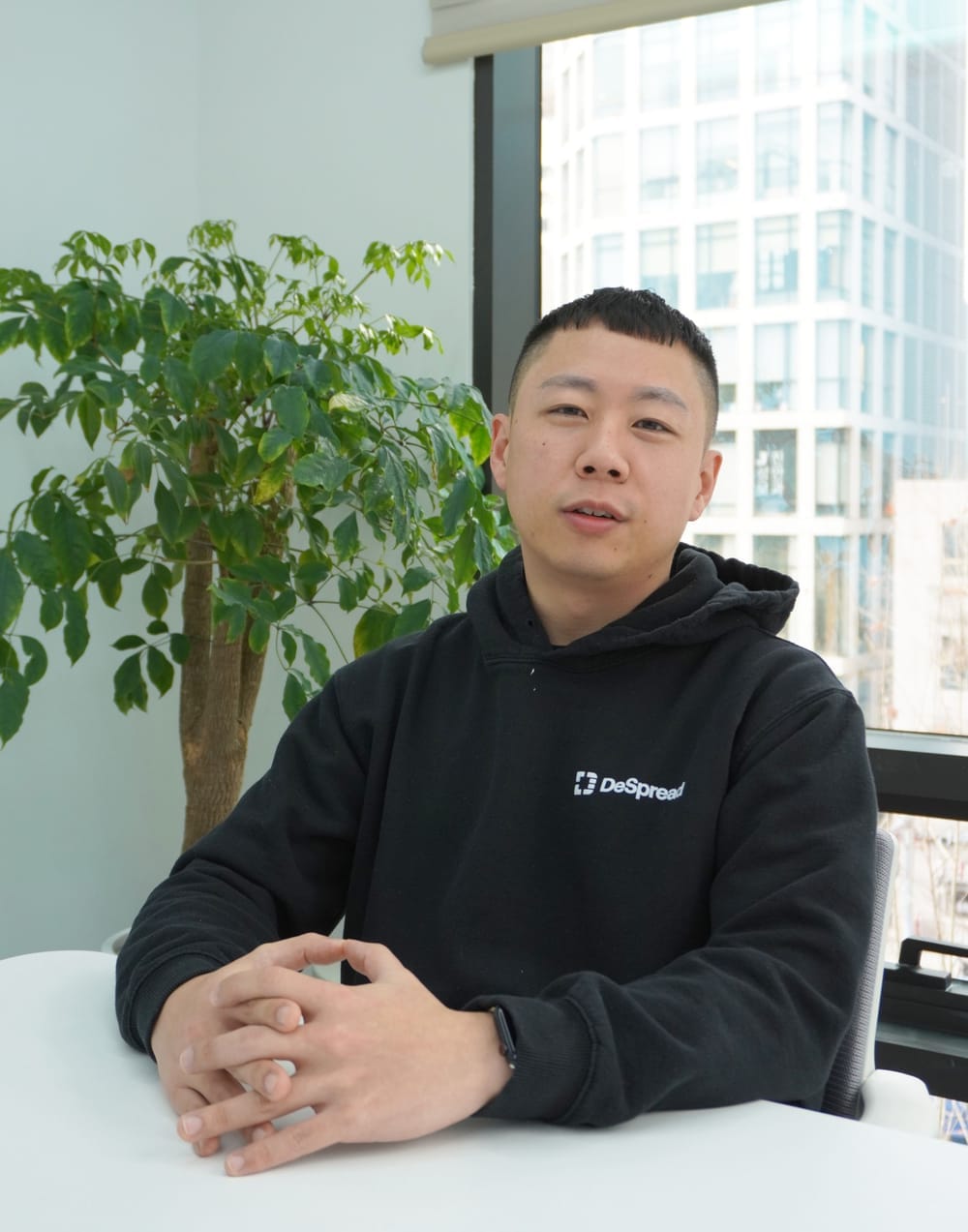
A Coffee Chat With D's Friends I Juhyuk Bak / Content Producer, Researcher
This time, We met with Juhyuk Bak, a content producer and researcher. We discussed his journey into content creation on various platforms, including YouTube, Telegram, and Twitter, and explored the importance of personal insights in the Web3 industry.

Reasons to Have Strong Opinions in Web3
**Disclaimer) The opinions expressed in this interview are those of the interviewer and do not represent the official statement of DeSpread.
Hello, I’m Eunji Cho at DeSpread. DeSpread is a company of “Degens” who are immersed in the Web 3 industry. Each of our team members has a unique personality, but we share the same DNA: a genuine love for Web 3. We work in a free-spirited atmosphere, but we’re all professionals in our respective fields.
Last time, we interviewed Jonathan Oh, Senior Consultant for our 12th Coffee Chat with D's Friends. This time, We met with Juhyuk Bak, a content producer and researcher. We discussed his journey into content creation on various platforms, including YouTube, Telegram, and X (previously Twitter), and explored the importance of personal insights in the Web3 industry.
Juhyuk regularly creates content with firmly established values and identity. Aren't you curious about the secret behind producing such content in the uncertain market of Web3?

Eunji: Could you please introduce yourself?
"I'm Juhyuk Bak, Content Producer for the DeSpred Research Team. I operate under the name 'Morbid-19' at X. 'Morbid' is a word used to describe having an intense obsession with something bizarre. It's a nickname I adopted while encountering various news stories during the COVID-19 pandemic, but it doesn't hold significant meaning."
Eunji: I'm curious about the reason you got into Web 3 industry.
"As I delved into my interests, I naturally ventured into the web3 industry. I discovered Bitcoin around 2015 via the internet. Initially, I bought a small amount, but then my interest waned. My attention returned around 2017 when the market began to rise again, and during that time, facing significant losses, I extensively researched articles and videos on my own. In 2019, anticipating the Bitcoin halving, I started engaging in Dollar Cost Averaging (DCA). My growing fascination with Bitcoin and cryptocurrencies drew my attention to related job opportunities. Upon entering Korea around 2021, I noticed a job advertisement for Xangle, applied, and thus began my career in web3."
Eunji: What did you do before joining DeSpread?
"Before joining DeSpread, I worked at Xangle, where I created content for social media and newsletters. I would write about 1-2 pieces per day, focusing on timely, fact-based, short articles. Xangle still offers newsletters, a service that was initiated during my tenure. I continue to regularly follow the Xangle newsletters. Additionally, as the company started new ventures, I also worked on tasks related to on-chain data."
Eunji: Why did you choose DeSpread within Web 3?
"The key catalyst was the role played by Do Dive, the team leader of the DeSpread Research Team. Do Dive had joined Xangle two weeks earlier than me, and we were on the same team at that time. Later, Do Dive moved to DeSpread.
Even after Do Dive's transition, we stayed in touch regularly, and fortunately, I got the opportunity to have a coffee chat with DeSpread. I had always felt a strong connection with DeSpread's vibe, perceiving it as a company well-aligned with my sensibilities and appreciating its freedom-oriented culture. During the coffee chat, they offered me a role that would effectively utilize my skills, which I found appealing. This opportunity led me to join DeSpread."
Eunji: What do you do at DeSpread?
"I currently have the role of Content Producer in the DeSpread Research Team. You can understand my role as being responsible for creating a wide range of content available on the internet. This includes writing newsletters for our Telegram (community), producing content for X, and creating YouTube videos. Although I am part of the research team, my focus is on producing more casual, social media-friendly content rather than conducting formal, rigid research.
Additionally, we organize offline events, and I am responsible for the planning and operation of these events."
Eunji: You've planned various events over time. Are there any that have been particularly memorable for you?
"Last year, before the Korea Blockchain Week (KBW), DeSpread hosted a party called 'Crypto Odyssey' to kick off KBW, inviting partners and industry acquaintances. About 200 people attended the event, and it's particularly memorable for me, perhaps because of the hard work that went into it.
I was responsible for planning everything from the venue rental, lighting, music, to the food. I also prepared for capturing the event through photos and videos. Additionally, on the day of the event, I was in charge of managing the VIP zone and overseeing the part-time staff we hired for the event."
Crypto Odyssey: Highlight. Source: KBW Youtube Channel
Eunji: I noticed you're managing a community and a YouTube channel. I'm interested in knowing what inspired you to start these!
"During my job search in 2021, I started a community and a YouTube channel. It was during this time that I came across a post by Naval Ravikant, an entrepreneur and investor, where he mentioned, 'We have this incredible tool called the internet, and yet most people don't use it effectively.'
He had a legendary thread on X titled 'How to Get Rich without getting lucky.' In this post, it emphasized that 'the best thing you can do as an individual is to create something like media or code that once produced, can be leveraged infinitely. You need to create things like this to survive in this era.' It mentioned leveraging the leverage of things like content because it's significant.
Upon reading this, it felt like the truth to me, and I thought, 'Let's try what Naval Ravikant suggests.' So, I started YouTube. Without much thought, I approached the things I'd read and the fields I enjoyed from an academic perspective. During the COVID outbreak, I collected and read interviews and materials related to it. As I turned these self-studied topics into YouTube content, my subscriber count gradually increased.
However, I realized that when the era comes where AI replaces people's jobs, there will likely be a real backlash. I believe there will be a clear demand for 'real (human-created) content,' not content produced by AI. So, I feel like I need to establish myself as a person beforehand. That's why I see YouTube not just as a means of content creation but also as my own survival tool in the face of the end of content and the artificial intelligence of content."

Eunji: I understand that you upload newsletters featuring insightful and latest trends from the community. Do you have any tips or methods for gathering information or quickly identifying trends in the web3 industry?
"I just consistently follow the things I'm interested in every day. This connects past and present content, leading to new insights. For example, if I consistently track a keyword, I can observe how people's perspectives on it change or understand the causes of conflicts among them. Then, I describe my observations. While the structure and presentation of an article are important, the most crucial aspect is continuously observing and recording the market. The newsletters I write in my personal Telegram group are part of this documentation. I believe that maintaining a routine of writing freely about my interests, without any constraints, could eventually lead to great content.
If I find myself short of topics, I look up blogs to see what others are discussing. This way, I can discover content I didn't know about and share new information with others. Creating content based on this information, in a quoted format, seems like a good way to keep the series going and share valuable insights with people."
Eunji: When I look at your content, I feel that your values and identity are firmly established. I'm curious about the secret to creating such content in the uncertain Web3 market!
"It is essential to actively express your opinions and not be afraid of being wrong. My opinions are just that, opinions, not facts. Therefore, I always keep in mind that I could be wrong, and even if I am, there's no need to feel down. Anyone can make mistakes. However, growing up in Korea, I noticed that people are often afraid of being wrong.
More important than fearing mistakes is the ability to gracefully acknowledge them. In fact, the public tends to appreciate when you admit your errors. They are more likely to be fond of 'me' as a person, rather than just my opinions. I once read a shocking comment saying, 'I don't understand a word Juhyuk is saying, but it's interesting.' It's not about what I think, but rather they like me as a person. That's why I believe it's important to strengthen your personal character. And this character just needs to be equipped with certain knowledge and culture.
As I mentioned earlier, if AI becomes commercialized and AI-based content prevails, content that only deals with facts without insight will struggle to stand out. Therefore, for content creators, I think it would be beneficial to enhance the character of 'you' as a person."
Eunji: You're creating content on various channels like YouTube, Telegram, and X. Could you describe the characteristics of the content you upload on each platform?
"I don't focus on posting a large number of contents on platform X because it operates based on algorithms. To get more exposure through the algorithm, it's necessary to increase the number of posts. However, I don't want to proliferate useless articles, so I've reduced the frequency of uploads and only occasionally post threads or comments.
On my personal Telegram channel, I post much more frequently. Telegram is familiar to the Korean communities, and it seems to have good engagement in terms of people reading my posts, commenting, or forwarding them. It's also a suitable platform for posting long articles like newsletters. Furthermore, since it doesn't rely on an algorithm-based approach, it's easier for me to write what I want, allowing me to upload more freely.
YouTube is aimed at a general audience. Therefore, I'm focusing on planning lighter content. YouTube tends to be popular for content related to prices or sensational keywords. That's why I'm creating content related to meme coins in one of my YouTube segments, 'Crypto Podcast'. In this content, I cover topics that interest me and that I find amusing.
I also invite Steve from Four Pillars and Do Dive, the head of our company's research team, to discuss technical insights. In this segment, we aim to present content that is popular but not superficial. It seems difficult to strike a balance on a platform like YouTube, where competition is fierce.
If you look at my YouTube, you'll find long-form videos. I like podcasts and want to give the audience the feeling of a conversation among close friends, which is why I plan these long-format contents. I also pay a lot of attention to the sound quality of the videos. The most realistic aspect when watching a video is the sound, right? I'm trying to convey the feeling I'm pursuing through sound.
Strategically, I am focusing on creating long-form content and continuously producing shorts to increase visibility. Indeed, my channel has been steadily growing, so it seems like a pretty good choice from a strategic standpoint."
> Juhyuk YouTube | Telegram | Paragraph | X

Eunji: I understand that you've recently been managing Paragraph as well. You mentioned that you started operating this platform to engage with the Farcaster and Base ecosystems. I'm curious about your description of this platform and why you are focusing on the Farcaster and Base ecosystems?
"Paragraph is a blogging platform that enables data decentralization. When users upload blog posts, they are stored in a storage system called Arweave, which utilizes IPFS. Users also have the option to mint NFTs of their posts.
This protocol sits atop a base chain, allowing me to share my written content on Farcaster through a framework. Farcaster is a type of protocol, enabling me to view the posts I've created on Paragraph via an app called Warpcast. Furthermore, within the Warpcast feed, users can subscribe or purchase the NFTs of the posts. The developers of Paragraph are continuously working to enhance its integration with Farcaster. The current low user base of Paragraph also seems to present a good opportunity for early adoption.
My anticipation for the base and Farcaster is partly due to their association with the company Coinbase. I understand that Coinbase is actively encouraging on-chain activities and, indeed, they reportedly use the catchphrase 'Onchain is the New Online.'
Moreover, Farcaster, just by looking at the Warpcast platform, seems to offer a superior app experience. Even if it doesn’t match X in terms of user experience, it's significantly better than similar apps that have been released before. The community gathered in the app appears to be more driven by the desire to establish a new community than by material incentives. The presence of people gathered purely for the sake of community makes it more appealing. Additionally, the framework enhances the experience of users with on-chain assets. Features like one-click NFT minting or subscribing on Paragraph are available. Considering these aspects, although Warpcast is not as widely used as X at the moment, I believe it has high growth potential in the future."
Eunji: In the Web3 industry, what is considered important during the content creation process, or what do you, as a content producer, regard as most important?
"When writing, it's beneficial not just to address the phenomenon itself but to also explain the narrative, such as the academic background or history related to it. I believe I mentioned this during my presentation at Decipher.
Anyone can deliver facts. To convey my thoughts convincingly and clearly, it's essential to include background knowledge. Additionally, to gain empathy, it's necessary to explain aspects like history. This is evident in movies and novels that are popular among the public.
The question of what one must do to become a good content producer seems a bit paradoxical to me. I'm not entirely sure what a content producer in the Web3 industry does.
However, based on my experience, I would like to advise 'confidently express the message you want to convey' and 'be able to derive insightful statements.'"
Eunji: Do you have any fields or projects that you've been recently interested in?
"I'm particularly interested in keywords related to Bitcoin, such as Bitcoin Layer 2 and new token standards for Bitcoin. Especially, I'm closely watching for the emergence of 'Runes' that are expected to appear around the Bitcoin halving. Runes, proposed by Casey Rodarmor, the founder of Audinus, are a token standard aimed at addressing the shortcomings of BRC-20.
Moreover, there are ongoing debates about Bitcoin Layer 2, which I think require a deep dive. Recently, various opinions have emerged regarding the feasibility of Bitcoin ZK-Rollups, and discussions similar to those seen in Ethereum about Rollups are also happening in the Bitcoin community. The reason I'm paying attention to these aspects is because whenever something new emerges, projects that seek to exploit it tend to appear. Therefore, it's essential to carefully examine whether the technology is actually being implemented. In such an environment, investors also have an incentive to learn about new developments.
I'm also interested in Farcaster. In fact, there seems to be some confusion about Farcaster. When people mention Farcaster, they often think of an interface similar to X, but the accurate name of that app is Warpcast. Farcaster is a protocol that stores user data such as followers and following. In other words, it's a structure that encapsulates interfaces like Warpcast on top of Farcaster.
The reason I value decentralized social networking services like Warpcast is because I believe users should have the right to access content without restrictions. During the U.S. presidential elections from 2016 to 2020, the role of social media and issues such as media power abuse were significant concerns. Censorship on social media began during that time, leading to debates about 'whose standards determine what is considered safe content.' To prevent distortion of reality, users should have the right to view the content they want without being influenced by anyone, and the content should exist in an environment where no one can manipulate it arbitrarily. That's why I've been interested in decentralized social media for a long time. Before Warpcast, I also looked into protocols like Lens Protocol."
Eunji: What do you think is the charm of the web3 industry?
"The people in the web3 market have unique characteristics, and I've enjoyed this sensibility. The unfiltered, bold expressions in anonymity and the memes that arise from here are also fun.
My interest and fondness for Bitcoin grew through Andreas Antonopoulos, an author and educator. I particularly liked the libertarian culture he talks about, where 'my financial activities are part of my freedom of expression.'
Furthermore, due to the nature of the industry, which spans finance and computer science, there's a lot to learn. From an investment perspective, the raw feel that manifests in the market and the clear distinction between winners and losers are apparent. I also find the culture of direct financial confrontations, a kind of head-to-head battle with money, interesting."
Eunji: Do you have any personal goals you want to achieve at DeSpread this year?
"I want to significantly grow our YouTube channel to establish it as a renowned media brand."

DeSpread’s Mission
DeSpread provides refined perspective for web 3 pioneers.